resources
Level of surfing
Evolved
Quality of surf
Excellent
Call code
34
Net code
es
Area
504030
Coastline
4,964 km
Climate
Continental inland. Oceanic up north. Mediterrenean along south and east coasts.
Hazards
Overcrowded Surf Breaks
Best Months
September - April
Population
45116894
Currency
euro (EUR)
Time Zone
Central European Time (UTC+1) - Central European Summer Time (UTC+2)
Special Requirements
Private Beaches
introduction
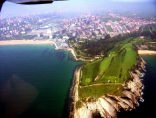
Maria Victoria Gomez Fernandez; Cabo Menor; 2007
Spain established itself as one of the prime surf destinations in Europe. Vibrant culture, rich history and long walls are there to be appreciated and extended stay sometimes is required to fully appreciate beauty of this place. A country of diversity, there is everything from lush meadows, snowy mountains to deserts, from beach breaks, to rivermouths, from reef breaks to strangest tidally dependant pits surfer might ever encounter.
history

Spanish Galleon
Spain has a very ancient and complex prehistory, with tribes arriving to the Iberian Peninsula as early as 35000 years back. Later, under the Roman rule, the land flourished and became one of the empire's most important regions. Followed bt Germanic tribes invasion. Later, nearly the entire peninsula came under Muslim rulers, leaving strong cultural imprint. Starting 722, Christian armies started reconquring the peninsula, reestablishing the rule in 1492. The year when Columbus reached the Americas, the foundations were layered for the Spanish Empire. Spain continued its warefare, stretching its resources to thin, along with other problems creating geopolitical instability, eventually leading to a diminished status at the start of the XVII century. In the first half of XX century, Spain came under a dictatorship, which it went through many years of stagnation and then a spectacular economic revival. In 1986 it joined the European Union and has experienced an economic and cultural renaissance.
surfing
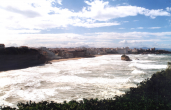
Geheimnisträgerin; Biarritz; September 1999
The most famous spot, Mundaka is very busy these days and patience is required, to keep it safe in the water and to pay respects to the local crew. However, if you want to have a peak for yourself, there is 4000 km of coastline to enjoy, with plenty of points to fire up the barrel rows as the right conditions come together.
With autumn considered being the best season on the swell hit rate/warmth ratio, take your time to explore the country's vast potential. Big low-pressure systems tracking from north produce consistent groundswells, rolling through September to December. Spanish surfers starting to make name for themselves in a big wave arena, there should be a little doubt whether to pack a bigger board for the ones braving winter Atlantic high surf.
Spanish coast is shaped in a peculiar way, giving options on those windy days, with bends and twists ensuring that most of the time you can get some protection for the lines to stay glassified.
The rule of busy weekend line ups applies in urbanised areas and classy surf spots, however, the coastline is immense and there are quite a few tidally dependant points (with up to 12ft tide ranges) pocketed in the coastal bends, which deserve no less attention of the observant traveller.
travel
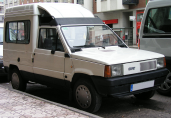
Randroide: SEAT Trans mid 80s; 2006
Spain is a member of the EU and the Schengen Agreement, which governs its visa policies. There are no border controls between Spain and other Schengen Agreement nations, making travel less complicated in case if you want to check some of the neighbouring countries spots.
There are several options available for getting into the country: car/train/bus from other European states, sailing and numerous flights landing frequently in the major cities of Spain. Make sure you are not flying British Airways (no surfboards allowed onboard) and Iberian Airlines (high charges per board in order of 100+ euros) to avoid complications with your surf gear.
Bus in Spain (and Europe) is generally the cheapest way to travel. You can expect to pay about 1 Euro per 10km. Coaches are usually neat and acceptably comfortable.
However, if you want to experience some of the more secluded points and got a decent quiver to move around, car rental is the way to go.
where to stay
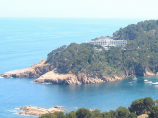
Paddy Briggs; The "Aigua Blava" Parador overlooking Aigua Blava Bay in the Costa Brava; October 2005
There are various types of accommodations available, ranging from hotels, pensions, rented villas, to camping or even monasteries.
There are three different names given to hotel-like accommodation in Spain’s urbanised areas, they are Hotel, Hostal and Pension. It is important not to confuse a hostel with a hostal; a hostel offers backpacker-type accommodation with shared rooms, whereas a hostal is very similar to a guest house and is generally cheaper than a hotel. Proximity to the beach and quality of the accommodation, generally reflected in the price , with variations between €10 to €100 per night.
For a more classy option, Parador ("inn"), a state owned hotel in Spain (rated 3 to 5 stars) is worth a look. Found mostly in historical buildings, such as convents, Moorish castles and haciendas, this hotel chain established in late 20s by King Alfonso, offers excellent way to experience Spain’s culture. Hospitality has been harmoniously integrated with the restoration of castles, palaces and convents, rescuing from ruin and abandonment monuments representative of Spain's historical and cultural heritage.
what to pack
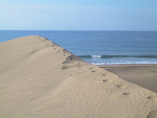
Roland Steinebach: Gran Canaria - Maspalomas dunes; 2002
Rain gear, hat, sunglasses, fleece/jacket, sunscreen and your usual ding fix and med kits could be handy. There is an option to rent boards and wetties in country’s surfzones for around 10-20 Euros a day, which might be just a solution in case if the trip is short. However, with longer stay, definitely worth bringing your favourite stick or two or even getting one from local shaper for around 300 Euros.
Comfortable footwear is a good one. Even if not planned - you will certainly end up walking for miles, either around town centres, mountain ridges, deserts, museums or along beaches and coastal walks.
dangers and warnings

Sherurcij: Fortunes of a Street Waif; 7 September 2007
As many developed European countries, Spain is not dangerous. Moreover, it has one of the lowest crime rates in Europe. So use the common sense, avoid wearing to much jewellery in public places, be aware of thieves in the major cities (Madrid, Barcelona, Seville), avoid lonely streets at night and you should be fine.
restaurants, shopping and nightlife

Peter Duhon: Nataliya Gotsiy modeling in Cynthia Rowley spring 2007 show, New York Fashion Week; September 14, 2006
Food in Spain is very healthy, with lots of vegetables and a great variety of meat and fish. This cuisine does not use many spices; it relies only on the use of high quality ingredients to give a good taste.
Tapas are like "starters" or "appetizers", but are considered in Spain as side orders to accompany your drink. There’s a great variety of tapas: meta, sea-food, etc. Locals usually order one tapa per drink. By the way, tapas can be served as breakfast as well.
You will still find McDonalds and Burger King in the major cities, though fast food has not yet established a strong grip on the Spaniards. But pizza is increasingly popular: Pizza Hut, TelePizza, etc.
And, of course, Spain would be great for those who loves seafood if you plan to stay on a seacoast. In this case it will be widely available and quite affordable. When it comes to meat, it is of great quality, as Spain has maintained quite a high percentage of free range animals.
Spain is part of the European Union and the Eurozone. If you need to exchange currency, you can do it in the airport or in the tourist zones in the major cities like Madrid or Barcelona. If you pay cash in the shops, remember that €500 banknotes are not accepted in many of them, so have alternative banknotes. When paying by credit card (which is widely accepted in Spain), make sure you always have your ID with you.
Most of the shops in Spain close during lunch time. Spain has well-known designer brands, such as Mango, Zara and Camper, but also has many local designer wear, which may be of your interest.
The Spanish are a nocturnal race. They sleep less than any other European nationality. Not surprisingly, nightlife is such an important facet of Spanish culture that the real hotspots are not the tourist resorts (apart from Ibiza), but the major Spanish cities like Madrid, Barcelona, Valencia, Bilbao, Granada and so on… Madrid is often called the nightclub capital of Europe. Some say it’s the nightclub capital of the world!
what to do when its flat
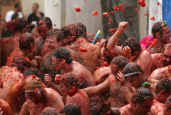
Aaronn Corey: Tomatina; August 31, 2005
There are plenty going on in Espania, aside from Surfing. Depending on the budget and time at disposal, some of the following activities can be an excellent addition to a surfing holiday:rafting, dolphin & whale watching, trail riding on Quads, flamenco dancing and explorative scootering around the area to name a few.
Also, this country is a great place to visit if you want to see some great festivals and carnivals. Just a few examples: Córdoba en Mayo (Cordoba in May), Las Cruces (1st week in May; big flower-made crosses embellishing public squares in the city center), Festival de Patios (check people's old Patios full of flowers), Cata del Vino Montilla-Moriles (great wine tasting in May),Fallas (in Valencia in March; burning the "fallas", is a must!). etc.
And another thing... not sure if you happen to enjoy it or not, but you definitely won't forget it! La Tomatina, a giant tomato fight in Buñol will be a good proof for your sense of humor!... And look, it's not strange if the picture on the right makes you think about a bunch of hungry children...
useful phrase guide

Javier Carro:Page of Lay of the Cid; May 2005
Hello/Hi (informal) - Hola (OH-lah)
How are you? (informal) - Cómo estás? (KOH-moh ehss-TAHSS?)
Fine, thank you - Muy bien, gracias. (MOOEY BYEHN, GRAH-thyahss)
My name is *** - Me llamo *** (MEH YAH-moh *** )
Nice to meet you - Encantado/a (ehn-kahn-TAH-doh/ehn-kahn-TAH-dah)
It's a pleasure to meet you - Mucho gusto. (MOO-choh GOOST-oh)
Please - Por favor (POHR fah-BOHR)
Thank you - Gracias (GRAH-thyahss)
You're welcome - De nada (DEH NAH-dah)
Yes - Sí (SEE)
No - No (NOH)
Excuse me (getting attention) - Disculpe (dees-KOOL-peh)
Excuse me (begging pardon) - Perdón (pehr-DOHN)
I'm sorry - Lo siento (LOH SYEHN-toh)
Goodbye - Adiós (ah-DYOHSS) / Hasta luego (AHS-tah LWEH-goh)
I can't speak Spanish (well) - No hablo (bien) español (NOH AH-bloh (BYEHN) ehs-pah-NYOL)
Do you speak English? - ¿Habla usted inglés? (AH-blah oos-TEHD een-GLEHSS?)
Is there someone here who speaks English? ¿Hay alguien que hable inglés? (HAHEE AHL-gyen KEH AH-bleh een-GLEHSS?)
Good morning - Buenos días (BWEH-nohss DEE-ahss)
Good afternoon / Good evening - Buenas tardes (BWEH-nahss TAR-dehss)
Good evening / Good night - Buenas noches (BWEH-nahss NOH-chehss)
I don't understand - No entiendo (NOH ehn-TYEHN-doh)
Where is the toilet? - ¿Dónde está el baño? (DOHN-deh ehss-TAH EHL BAH-nyoh?)
Police! - ¡Policía! (poh-lee-SEE_ah!)
Stop! Thief! - ¡Alto, ladrón! (AHL-toh, lah-DROHN!)
I need help - Necesito ayuda. (neh-seh-SEE-toh ah-YOO-dah)
It's an emergency - Es una emergencia. (ehs oo-nah eh-mehr-HEHN-syah)
I need a doctor - Necesito un doctor. (neh-seh-SEE-toh OON dohk-TOHR)
Can I use your phone? - ¿Puedo usar su teléfono? (PWEH-doh oo-SAHR soo teh-LEH-foh-noh?)






